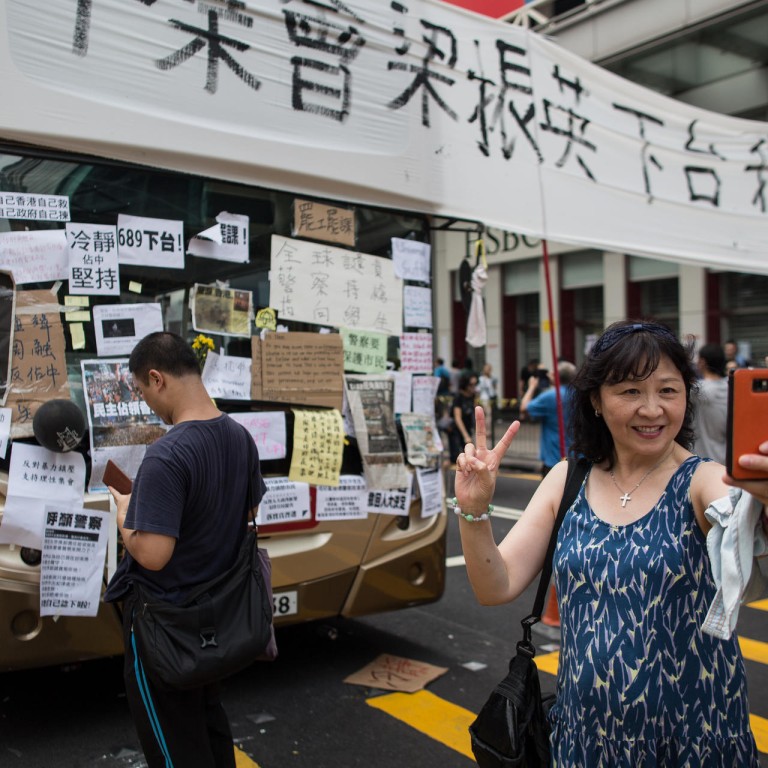
Tung Chee-hwa and Hong Kong government's 'gloom and doom' propaganda hokum
Instead of talking up the economy, government officials and supporters are saying it will only get worse as 'umbrella' protests hit the city
We are living in a very strange world when government officials and their backers make it their business to talk down the economy and spread despondency while government opponents studiously abstain from the gloom fest.
Yet this is precisely what is happening in Hong Kong now.
In most places, government officials do their best to talk up the economy. Even when things are really bad, they search desperately for shards of light to relieve the gloom.
However, listening to officials providing an economy commentary is a bit like identifying deep insights in Mickey Mouse comics: it is a waste of time.
Mind you, at least the dreaded Mouse provides entertainment, while government officials and politicians strut the stage for the less edifying purpose of covering their backsides and pursuing a political agenda. They play loose and fast with data and stretch its interpretation to serve less than benign interests.

Last week, he said hotel bookings and credit card spending had slumped 20 to 30 per cent since the beginning of the umbrella movement protests and, obviously feeling that this declaration was insufficiently depressing, went on to say "the fall is staggering and even more worrying is that it was not a gradual drop but a sudden plunge". And, in case anyone dared harbour any sense of optimism, he warned that things were set to get worse.
No one, including Tung himself, has been able to produce the data on which these claims are based, but there are some real figures to hand that inconveniently refute these claims. For example, mainland group tours to Hong Kong rose 90 per cent from October 1 to 22, despite reports of a ban on these tours initiated by the mainland authorities in the first week of this month. That was also the week in which the number of visitor arrivals from the mainland rose almost 7 per cent from the same period last year.
We have yet to see any comprehensive retail sales data for the past month, but anecdotal evidence, backed by some reporters' legwork, shows that while retail sales have fallen in demonstration areas, other areas have put on big increases. Moreover, some businesses in these areas, especially fast-food providers, have found themselves selling out on a daily basis. Then there is the case of luxury department store Lane Crawford, which registered a 300 per cent surge in online sales during the first three weeks of the protests.
This is not to say that businesses have not been hit by the protests, but allegations of an economic slump are, to put it mildly, somewhat premature. It is therefore safe to treat the more alarmist statements for what they are: political propaganda.
And this kind of propaganda works both ways because when economies are doing well, politicians like to imply that stellar performance is somehow thanks to their shrewd management of the economy. Some go further and actually plunge into the economic maelstrom and meddle like mad in the markets. This happened in the wake of the Asian financial crisis in the late 1990s when the Tung government shed its laissez-faire beliefs and plunged into the stock market waving very large sums of taxpayers' cash. The result was an eventual market recovery, but it came at more or less the same time as the recovery in other Asian markets, which simply allowed share prices to come back at their own pace.
Those who are sordid enough to actually engage in the business of making and selling real products can look at the hyperactivity in government and its propaganda machine safe in the knowledge that this is very much a case of sound and fury signifying very little.
However, we cannot afford to be complacent because governments do have the ability to wreck business, and in the current crisis, we are seeing signs that the mainland authorities are inclined to "teach Hong Kong a lesson" by, for example, going slow on the establishment of the link between the local bourse and the Shanghai stock exchange.
READ MORE: To view all the latest Occupy Central stories click here
If there really is deliberate action under way to undermine the Hong Kong economy by the very people who are supposed to provide responsible government, the question needs to be asked: who is it that really cares about Hong Kong?
Maybe Mr Gloom-Spreader-in-Chief would care to supply an answer.

